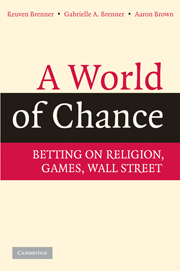Book contents
- Frontmatter
- Contents
- Preface
- Acknowledgments
- 1 From Religion to Risk Management: What to Do When Facing Uncertainty?
- 2 Anything Wrong with Gambling as a Pastime?
- 3 Are You Rich? Risk-Taking and Gambling, or the Leapfrogging Instinct
- 4 Betting on Futures and Creating Prices
- 5 Gambling as Banking: Poker, Junk Bonds, and Central Banks
- 6 Lottery Is a Taxation, and Heav'n Be Prais'd, It Is Easily Rais'd
- 7 Politics and Prohibitions; or, What's a Good Tax Anyway?
- 8 How Gamblers and Risk-Takers Correct the Future
- Appendix 1 Gambling and Risk-Taking: The Leapfrogging Instinct
- Appendix 2 Human Nature and the Civilizing Process
- Appendix 3 A Statistical Profile of Gamblers
- Notes
- Bibliography
- Name Index
- Subject Index
Appendix 2 - Human Nature and the Civilizing Process
Published online by Cambridge University Press: 06 July 2010
- Frontmatter
- Contents
- Preface
- Acknowledgments
- 1 From Religion to Risk Management: What to Do When Facing Uncertainty?
- 2 Anything Wrong with Gambling as a Pastime?
- 3 Are You Rich? Risk-Taking and Gambling, or the Leapfrogging Instinct
- 4 Betting on Futures and Creating Prices
- 5 Gambling as Banking: Poker, Junk Bonds, and Central Banks
- 6 Lottery Is a Taxation, and Heav'n Be Prais'd, It Is Easily Rais'd
- 7 Politics and Prohibitions; or, What's a Good Tax Anyway?
- 8 How Gamblers and Risk-Takers Correct the Future
- Appendix 1 Gambling and Risk-Taking: The Leapfrogging Instinct
- Appendix 2 Human Nature and the Civilizing Process
- Appendix 3 A Statistical Profile of Gamblers
- Notes
- Bibliography
- Name Index
- Subject Index
Summary
Which briefly compares various views of human nature.
The model's simplicity may remind readers of Ockham's suggestion that the unnecessary multiplication of assumptions should be avoided and to look for the simplest model that sheds light on the widest range of evidence. That is what I tried to do.
Bets on ideas
The terms “gamble” and “probability” are used in two different contexts throughout the book and Appendix 1. When speaking about lotteries and insurance, the word “probability” has been used to represent the notion of a probability distribution – the assignment of probabilities to a set of related events, events that could be repeated many times. These probability distributions were assumed to be the same for everyone.
But the term “probability” has also been used in a totally different context: to represent the degree of belief an individual has attached to the success or the failure of implementing a new idea, a deviation from customary behavior. These are ideas that cross our minds, but that we bring to life in some circumstances and not others.
How this probability got into our minds, I do not know. In Appendix 1, this probability is somehow “there.” To use a medical vocabulary: perhaps a “radical” before it becomes free. But one acts upon the probability only when leapfrogged. Our ancestors might have called bringing such ideas to life divine inspiration. The words I have used seem clearer: risk-taking, creativity, or entrepreneurship.
- Type
- Chapter
- Information
- A World of ChanceBetting on Religion, Games, Wall Street, pp. 251 - 256Publisher: Cambridge University PressPrint publication year: 2008



